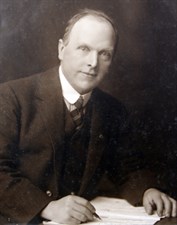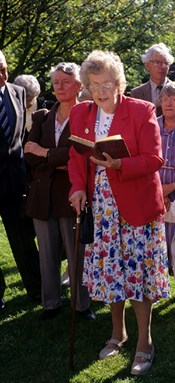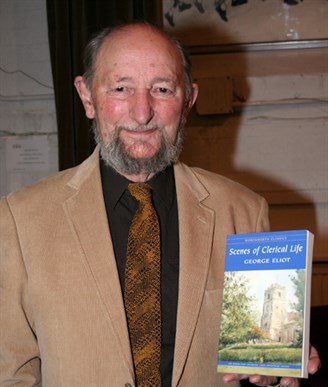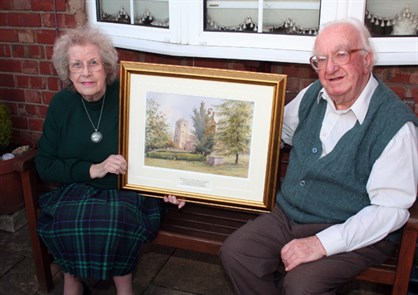A Brief History
The George Eliot Fellowship
A Brief History of The Fellowship
The George Eliot Fellowship  The second Birthday Supper, on 23rd November 1931was founded by Mr A F Cross on 9 November 1930. Mr Cross was the editor of the Nuneaton Chronicle newspaper and had been campaigning for some 25 years for a memorial to George Eliot in her native town, Nuneaton. During the summer of 1930 Mr Cross handed over the Editorial chair of the Nuneaton Chronicle to a Cambridge undergraduate. The undergraduate in turn managed to elicit contributions from eminent literary men of the day such as George Bernard Shaw by asking them the question, "Should Nuneaton erect a memorial to George Eliot? If so, what form should it take?" The majority of the writers he approached were surprised that a memorial did not already exist.
The second Birthday Supper, on 23rd November 1931was founded by Mr A F Cross on 9 November 1930. Mr Cross was the editor of the Nuneaton Chronicle newspaper and had been campaigning for some 25 years for a memorial to George Eliot in her native town, Nuneaton. During the summer of 1930 Mr Cross handed over the Editorial chair of the Nuneaton Chronicle to a Cambridge undergraduate. The undergraduate in turn managed to elicit contributions from eminent literary men of the day such as George Bernard Shaw by asking them the question, "Should Nuneaton erect a memorial to George Eliot? If so, what form should it take?" The majority of the writers he approached were surprised that a memorial did not already exist.
 Our founder, A F CrossMr Cross concluded that Nuneaton's apathy should be allowed to continue no longer. He was certain that corporate action was now more important than individual effort and that the formation of a literary society was the answer. The title of 'Fellowship' rather than society was a personal choice of Mr Cross, as he felt it to be most suited to admirers of a woman who still had a message for present and future generations.
Our founder, A F CrossMr Cross concluded that Nuneaton's apathy should be allowed to continue no longer. He was certain that corporate action was now more important than individual effort and that the formation of a literary society was the answer. The title of 'Fellowship' rather than society was a personal choice of Mr Cross, as he felt it to be most suited to admirers of a woman who still had a message for present and future generations.
At about the same time, correspondence arose in the London Press about George Eliot's work and mention was made of the possibility of a George Eliot Society being formed. As a result letters began to arrive at the Nuneaton Chronicle from all over England from people eager for more information. Mr Cross needed no more encouragement, and a preliminary meeting was held in the Council Chamber in Nuneaton in October 1930. The idea of a Fellowship was accepted and Miss Elizabeth Haldane, a distinguished early biographer of George Eliot was elected as the first President. Plans were made for a dinner to be held on George Eliot's birthday at the Newdegate Arms. The principal guest was Mr J Lewis and it was he who proposed the toast to the 'Immortal Memory of George Eliot', a toast that is raised every year at the Birthday Luncheon. A week after the dinner a notice appeared in the Nuneaton Chronicle about a meeting to elect officers. At the meeting, held on 15 January 1931 officers were elected; Mr Cross was to be Chairman, and members of the Council included Mr S Pratt, Mr J Benfell, Councillor G Taylor and Miss K Grant.
Most of the activities in the 1930s seem to have revolved around an annual supper, with speeches. At the first one there were 14 speakers. All no doubt had important things to say. In 1934 the Fellowship held its first wreath-laying. The official group met first at Griff House and then went to Arbury Park where the obelisk was situated. Sprigs of rosemary were distributed (this practice has been revived in recent years) and a wreath of eleven bronze and yellow chrysanthemums set in laurel leaves was laid. The Mayor, Councillor S Deeming, expressed regret in his address that he had not read much George Eliot, but hoped to do better in future - sentiments we have heard many, many times since!
 Kathleen Adams reading the funeral of Milly Barton scene in Chilvers Coton churchyardBy 1939 the Fellowship owed £20 to its Treasurer for unpaid expenses. The start of war meant that the Fellowship suspended its activities until October 1947 and in the early post-war years we were active in persuading the Council to create the George Eliot Memorial Gardens on the site alongside the river which had previously been back gardens of houses bombed in 1941 in Church Street (one of which featured as Lawyer Dempster's house in Orchard Street in Janet's Repentance) The first post-war Birthday Dinner was held in 1953 at the Masonic Hall, and the toast to the Immortal Memory was proposed by Dr Gordon S Haight.
Kathleen Adams reading the funeral of Milly Barton scene in Chilvers Coton churchyardBy 1939 the Fellowship owed £20 to its Treasurer for unpaid expenses. The start of war meant that the Fellowship suspended its activities until October 1947 and in the early post-war years we were active in persuading the Council to create the George Eliot Memorial Gardens on the site alongside the river which had previously been back gardens of houses bombed in 1941 in Church Street (one of which featured as Lawyer Dempster's house in Orchard Street in Janet's Repentance) The first post-war Birthday Dinner was held in 1953 at the Masonic Hall, and the toast to the Immortal Memory was proposed by Dr Gordon S Haight.
By 1957 the Fellowship was "in a state of quiet slumber", with only two events during the year, though in 1958 the speaker at the Dinner was British literary scholar, Barbara Hardy. Membership seems to have been in decline too, and by the end of 1967 we had 21 ordinary members and 5 life members. But help was at hand. Bill Adams attended the AGM that year, and soon found himself on the committee. In 1968 Bill's wife Kathleen also got involved and in that year she took over as Secretary, a post she was to hold with great distinction for 40 years, ably supported always by Bill, both unofficially as a husband and helper, but for over 20 years as Chairman.
In her history of the Fellowship (available as a download) Kathleen Adams comments that "After so many years in the doldrums, the Fellowship suddenly burst into life in 1969". The reason for this she ascribes to the 150th anniversary of Eliot's birth. But she is too modest. The reason for new life in the Fellowship was because of the work of Kathleen and Bill, who set about transforming, enlarging and rejuvenating the Fellowship. Bill was a tax inspector, so valued accuracy. Kathleen was a school secretary, so could type and had access to Gestetner printers (remember them, and the ink that always got onto your hands and clothes?) I mention it because the first George Eliot Reviews were printed on such a duplicating machine, collated and stapled by Kathleen and Bill - a real labour of love.
 Revd Edward Pogmore at Westminster AbbeyThere can be little doubt that without the work of Kathleen and Bill the Fellowship would have gone into terminal decline. The pattern of meetings and events we still maintain was devised by them, though in recent years we have added extra events. Two examples will suffice to explain the impact they had on the Fellowship and the world. After the wonderful events of 1969 to celebrate the 150th anniversary of Eliot's birth, the Fellowship decided that it was time to have a memorial to her in Westminster Abbey. Negotiations were started in 1973 which would lead to the unveiling of the plaque in the floor of Poets' Corner in the Abbey in 1980, to mark the centenary of Eliot's death. Guest of honour was Gordon Haight at a ceremony in front of 700 people. This was only one of many other centenary events. Every year for 25 years we held a wreath-laying in the Abbey. Since 2005 we have held it every other year. The picture shows guest of honour Revd. Edward Pogmore in 2012.
Revd Edward Pogmore at Westminster AbbeyThere can be little doubt that without the work of Kathleen and Bill the Fellowship would have gone into terminal decline. The pattern of meetings and events we still maintain was devised by them, though in recent years we have added extra events. Two examples will suffice to explain the impact they had on the Fellowship and the world. After the wonderful events of 1969 to celebrate the 150th anniversary of Eliot's birth, the Fellowship decided that it was time to have a memorial to her in Westminster Abbey. Negotiations were started in 1973 which would lead to the unveiling of the plaque in the floor of Poets' Corner in the Abbey in 1980, to mark the centenary of Eliot's death. Guest of honour was Gordon Haight at a ceremony in front of 700 people. This was only one of many other centenary events. Every year for 25 years we held a wreath-laying in the Abbey. Since 2005 we have held it every other year. The picture shows guest of honour Revd. Edward Pogmore in 2012.
 There is a quiet pensiveness about the statue which seems entirely fittingThe second example of the impact of Kathleen and Bill Adams was a few years later when it was decided that Nuneaton had talked about a memorial to George Eliot for long enough and now was the time to commission a statue. The superb piece of sculpture by local artist John Letts now stands in Newdegate Square, Nuneaton, a tribute to the fund-raising, the hard work and determination of Kathleen and Bill to honour George Eliot. It was unveiled in March 1986 by our then President, Jonathan Ouvry to great acclaim. The statue was paid for by the Fellowship, the plinth by Nuneaton and Bedworth Borough Council.
There is a quiet pensiveness about the statue which seems entirely fittingThe second example of the impact of Kathleen and Bill Adams was a few years later when it was decided that Nuneaton had talked about a memorial to George Eliot for long enough and now was the time to commission a statue. The superb piece of sculpture by local artist John Letts now stands in Newdegate Square, Nuneaton, a tribute to the fund-raising, the hard work and determination of Kathleen and Bill to honour George Eliot. It was unveiled in March 1986 by our then President, Jonathan Ouvry to great acclaim. The statue was paid for by the Fellowship, the plinth by Nuneaton and Bedworth Borough Council.
 Sculptor John Letts, photographed in 2007 with a copy of the Fellowship edition of the 150th anniversary edition of Scenes of Clerical LifeBill stepped down as Chairman in 2006, Kathleen in 2008 after she had completed 40 years as Secretary. The Fellowship members made a very generous gift to her, part of which purchased a special chair, and a retirement party was held at Arbury Hall, so appropriate after the numerous times they had taken visitors to the stately home which was very dear to them both. Earlier, we had also given them a framed copy of the watercolour of Chilvers Coton church (Shepperton) which we had used on the cover of our anniversary edition.
Sculptor John Letts, photographed in 2007 with a copy of the Fellowship edition of the 150th anniversary edition of Scenes of Clerical LifeBill stepped down as Chairman in 2006, Kathleen in 2008 after she had completed 40 years as Secretary. The Fellowship members made a very generous gift to her, part of which purchased a special chair, and a retirement party was held at Arbury Hall, so appropriate after the numerous times they had taken visitors to the stately home which was very dear to them both. Earlier, we had also given them a framed copy of the watercolour of Chilvers Coton church (Shepperton) which we had used on the cover of our anniversary edition.
As if they did not have enough to do, in 1973 Kathleen and Bill had founded The Alliance of Literary Societies, which is celebrated its 50th anniversary in 2023.
Elsewhere on the website there will be a longer history of the Fellowship. The present Fellowship Council is as keen as ever to continue the work of the past 80 years, but it is humbling to come up with new ideas, only to find that Kathleen and Bill had done something similar 20, 30 or 40 years ago. They, as well as George Eliot, inspire us still.
 Kathleen and Bill outside their living room window with the watercolour of Chilvers Coton church
Kathleen and Bill outside their living room window with the watercolour of Chilvers Coton church

